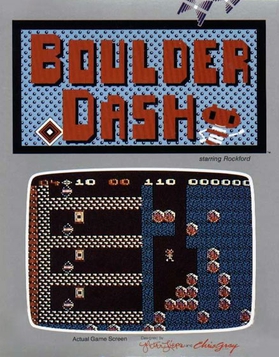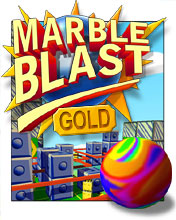
Quake III Arena is a 1999 multiplayer-focused first-person shooter developed by id Software. The third installment of the Quake series, Arena differs from previous games by excluding a story-based single-player mode and focusing primarily on multiplayer gameplay. The single-player mode is played against computer-controlled bots. It features music composed by Sonic Mayhem and Front Line Assembly founder Bill Leeb.

The history of video games began in the 1950s and 1960s as computer scientists began designing simple games and simulations on minicomputers and mainframes. Spacewar! was developed by Massachusetts Institute of Technology (MIT) student hobbyists in 1962 as one of the first such games on a video display. The first consumer video game hardware was released in the early 1970s. The first home video game console was the Magnavox Odyssey, and the first arcade video games were Computer Space and Pong. After its home console conversions, numerous companies sprang up to capture Pong's success in both the arcade and the home by cloning the game, causing a series of boom and bust cycles due to oversaturation and lack of innovation.

Marble Madness is an arcade video game designed by Mark Cerny and published by Atari Games in 1984. It is a platform game in which the player must guide a marble through six courses, populated with obstacles and enemies, within a time limit. The player controls the marble by using a trackball. Marble Madness is known for using innovative game technologies: it was Atari's first to use the Atari System 1 hardware, the first to be programmed in the C programming language, and one of the first to use true stereo sound.

Zaxxon is an isometric shooter arcade video game, developed and released by Sega in 1982. The player pilots a ship through heavily defended space fortresses. Japanese electronics company Ikegami Tsushinki also developed the game.

Centipede is a 1981 fixed shooter arcade video game developed and published by Atari, Inc. Designed by Dona Bailey and Ed Logg, it was one of the most commercially successful games from the golden age of arcade video games and one of the first with a significant female player base. The primary objective is to shoot all the segments of a centipede that winds down the playing field. An arcade sequel, Millipede, followed in 1982.

Boulder Dash is a 2D maze-puzzle video game released in 1984 by First Star Software for Atari 8-bit computers. It was created by Canadian developers Peter Liepa and Chris Gray. The player controls Rockford, who collects treasures while evading hazards.

Lode Runner is a 2D puzzle-platform game, developed by Doug Smith and published by Broderbund in 1983. Its gameplay mechanics are similar to Space Panic from 1980. The player controls a character who must collect all the gold pieces in a level and get to the end while being chased by a number of enemies. It is one of the first games to include a level editor.

Paperboy is an arcade action game developed and published by Atari Games, and released in 1985. The player takes the role of a paperboy who delivers a fictional newspaper called The Daily Sun along a street on his bicycle. The arcade version of the game featured bike handlebars as the controller.

Cinemaware was a video game developer and publisher. It had released several titles in the 1980s based on various film themes. The company was resurrected in 2000, before being acquired by eGames in 2005.
Torque Game Engine, or TGE, is an open-source cross-platform 3D computer game engine, developed by GarageGames and actively maintained under the current versions Torque 3D as well as Torque 2D. It was originally developed by Dynamix for the 2001 first-person shooter Tribes 2. In September 2012, GarageGames released Torque 3D as open-source software under the MIT License.

Bill Budge is a retired American video game programmer and designer. He is best known for the Apple II games Raster Blaster (1981) and Pinball Construction Set (1983).
GarageGames was a game technology and software developer. GarageGames was the parent company of GG Interactive, developers of educational technology in the areas of computer science, video game development and programming. In addition, the company has been a video game developer and publisher. GarageGames created several game engines targeted for indie development. Founded in Eugene, Oregon, the company had offices in Las Vegas, Nevada, United States and its headquarters in Vancouver, Washington. In 2007, GarageGames was acquired by IAC and the company was renamed TorquePowered. In 2011, the company was purchased by Graham Software Development and reverted to the original name GarageGames.

Over one hundred video games based on the Star Wars franchise have been released, dating back to some of the earliest home consoles. Some are based directly on films while others rely heavily on the Star Wars Expanded Universe.
Xbox Live Arcade (XBLA) is a video game digital distribution service available through the Xbox Games Store, Microsoft's digital sales platform for the Xbox 360. It focused on smaller downloadable games from both major publishers and independent game developers. Titles ranged from classic console and arcade video games, to new games designed from the ground up for the service. Games available through the XBLA service ranged from $5–20 in price, and as of October 2016, there have been 719 Xbox Live Arcade titles released for the Xbox 360. Prior to the Xbox 360, "Xbox Live Arcade" was the name for an online distribution network on the original Xbox, which was replaced by the Xbox Live Marketplace.

Marble Blast Ultra is a 3D puzzle action game involving a marble developed by GarageGames. It was released on January 25, 2006 for the Xbox 360 via Xbox Live Arcade. It is the sequel to Marble Blast Gold. It features 60 levels, enhanced graphics, 2 new power-ups and a multiplayer mode. A PC port of the game under the title Marble Blast Online was available at InstantAction until the website was shut down. As of year-end 2010, Marble Blast Ultra has sold over 756,000 copies.

Zuma is a 2003 tile-matching puzzle video game developed by Oberon Media and published by PopCap Games. It was released for a number of platforms, including PDAs, mobile phones, and the iPod.

RocketBowl is a sports game developed by LargeAnimal and published by GarageGames, released November 4, 2004 for Windows. The game features a retro-futuristic 1950s theme. It was also released on the Xbox 360 through Xbox Live Arcade on September 10, 2008.

Geon: Emotions is a multiplayer-oriented action arcade video game developed by independent software developer Strawdog Studios for the Xbox 360 Xbox Live Arcade service. The title was announced during Microsoft's E3 2007 press conference and was released September 19, 2007 on Xbox Live Arcade.

The Pinball Arcade is a pinball video game developed by FarSight Studios. The game is a simulated collection of 100 real pinball tables licensed by Gottlieb, Alvin G. and Company, and Stern Pinball, a company which also owns the rights of machines from Data East and Sega Pinball. Williams and Bally games are no longer available since June 30, 2018, as FarSight had lost the license to WMS properties, which has since passed to Zen Studios.
Apple Arcade is a video game subscription service offered by Apple. It is available through a dedicated tab of the App Store on devices running iOS 13, VisionOS, tvOS 13, iPadOS 13, and macOS Catalina or later. The service launched on September 19, 2019.
















